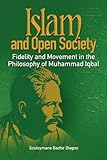Islam and Open Society Fidelity and Movement in the Philosophy of Muhammad Iqbal.
Material type: TextPublisher: Dakar : CODESRIA (Conseil pour le Developpement de la Recherche Economique et Sociale en Afrique), 2011Copyright date: ©2011Description: 1 online resource (90 pages)Content type: text Media type: computer Carrier type: online resourceISBN: 9782869784345Subject(s): Iqbal, Muhammad, -- Sir, -- 1877-1938 | Islam and civil societyGenre/Form: Electronic books.Additional physical formats: Print version:: Islam and Open Society Fidelity and Movement in the Philosophy of Muhammad IqbalDDC classification: 320.550917671 LOC classification: PK2199.I65 -- Z535 2010ebOnline resources: Click to View
TextPublisher: Dakar : CODESRIA (Conseil pour le Developpement de la Recherche Economique et Sociale en Afrique), 2011Copyright date: ©2011Description: 1 online resource (90 pages)Content type: text Media type: computer Carrier type: online resourceISBN: 9782869784345Subject(s): Iqbal, Muhammad, -- Sir, -- 1877-1938 | Islam and civil societyGenre/Form: Electronic books.Additional physical formats: Print version:: Islam and Open Society Fidelity and Movement in the Philosophy of Muhammad IqbalDDC classification: 320.550917671 LOC classification: PK2199.I65 -- Z535 2010ebOnline resources: Click to View Cover -- Title page -- Copyright page -- Contents -- Acknowledgements -- Preface -- Introduction -- Chapter I - A faylasûf of Today -- Chapter II - A Philosophy of the Individual -- Self-affirmation -- The Test of Consistency -- A Cosmology of Emergence -- Chapter III - A Philosophy of Action -- Movement and Action -- Fatum, Time and Prayer -- An Ethics of Consumption -- A Philosophy of Living -- A Philosophy of Tolerance -- A Politics of Autonomy -- Chapter IV - Fidelity and Movement -- On Science -- Ijtihâd and Open Society -- Conclusion - On Modernity -- Notes -- References -- Back cover.
In the atmosphere of suspicion and anger that characterizes our time, it is a joy to hear the voice of Iqbal, both passionate and serene. It is the voice of a soul that is deeply anchored in the Quranic Revelation, and precisely for that reason, open to all the other voices, seeking in them the path of his own fidelity. It is the voice of a man who has left behind all identitarian rigidity, who has 'broken all the idols of tribe and caste' to address himself to all human beings. But an unhappy accident has meant that this voice was buried, both in the general forgetting of Islamic modernism and in the very country that he named before its existence, Pakistan, whose multiple rigidities � political, religious, military � constitute a continual refutation of the very essence of his thought. But we all need to hear him again, citizens of the West, Muslims, and those from his native India, where a form of Hindu chauvinism rages in our times, in a way that exceeds his worst fears. Souleymane Bachir Diagne has done all of us an immense favor in making this voice heard once again, clear and convincing. Charles Taylor, Professor, McGill University Quebec, Canada.
Description based on publisher supplied metadata and other sources.
Electronic reproduction. Ann Arbor, Michigan : ProQuest Ebook Central, 2018. Available via World Wide Web. Access may be limited to ProQuest Ebook Central affiliated libraries.

There are no comments on this title.